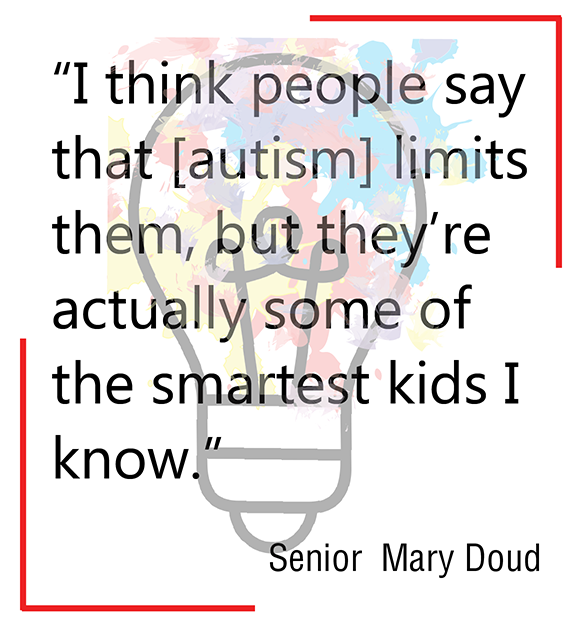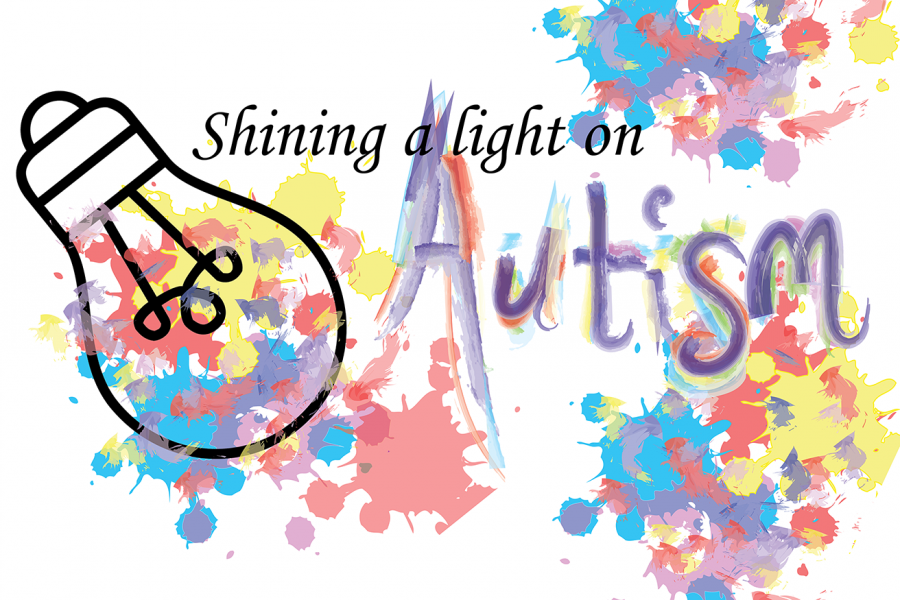Shining a light on Autism
In honor of Autism Awareness Month, students illuminate the ways they are affected by different sides of the autistic spectrum
 Senior Phil Prevosto walks outside with his brother, looking around at the nature and beauty surrounding them. As they walk, they see a flower sprouting out of the ground. Prevosto’s brother turns to him and says, “Oh, look at that flower, look how awesome that is,” while Prevosto responds, “Yeah, it is sweet. It’s awesome.”
Senior Phil Prevosto walks outside with his brother, looking around at the nature and beauty surrounding them. As they walk, they see a flower sprouting out of the ground. Prevosto’s brother turns to him and says, “Oh, look at that flower, look how awesome that is,” while Prevosto responds, “Yeah, it is sweet. It’s awesome.”
Prevosto’s 23-year-old brother, Dylan, was diagnosed with autism at the age of 11. As a result of the disability, “He just sees everything in beauty and has a child-like mindset in his life, so it’s pretty awesome,” Prevosto said. This child-like mindset is commonly associated with adults who have autism and is the result of developmental delays, according to WebMD.
According to autismspeaks.org, “Autism refers to a range of conditions characterized by challenges with social skills, repetitive behaviors, speech and nonverbal communication, as well as by unique strengths and differences.”
This disability impacts thousa nds of individuals across the country. According to the Autism Science Foundation, “approximately 1 in 68 children in the United States has been identified with an Autism Spectrum Disorder (ASD).”
nds of individuals across the country. According to the Autism Science Foundation, “approximately 1 in 68 children in the United States has been identified with an Autism Spectrum Disorder (ASD).”
Junior Paul Diehl’s 18-year-old brother, Chris, has a high-functioning form of autism. He experiences challenges with social skills, in particular, struggling to recognize social cues.
“For the most part, it’s all about social cues and being natural. That’s a big issue, [for example] looking into people’s eyes is weird. You have to teach that, and after you do, he’s fine,” Diehl said.
Junior Sahil Menon also experienced difficulty with recognizing social cues. At the age of five, Menon was diagnosed with Asperger’s syndrome, the lowest form of autism on the autistic spectrum. Despite the difficulty of understanding social cues, Menon was able to strengthen his social skills. “Going to the social skills groups and the therapy groups, it really helps … You have to grind really hard and really practice your social skills,” he said.
Other symptoms that accompany autism include difficulty in communicating, limited and specific interests in activities, and preoccupation with certain foods, items, or routines.
According to Menon, he experienced many of these symptoms in addition to sensory dysregulation, a symptom commonly attributed to Asperger’s syndrome.
Sensory dysregulation modifies senses which causes someone to be too sensitive, or not sensitive enough, to certain things. With Menon, his perception of taste and texture were affected. “When I was young, I used to love eating things with McDonald’s ketchup and really weird stuff like that. I also used to love to eat alphabet soup, even at any restaurant,” Menon said.
In addition to struggles with sensitivity to texture, people with autism can also be sensitive to sound. This became rather problematic for Menon, as it started to impact his sense of hearing. “I couldn’t bear loud noises. I would throw up. I would get nauseous in the cafeteria in elementary school because the noise would just kill me,” he said.
After those experiences, Menon’s situation got worse. “I got even more socially isolated after that because they made me sit outside the cafeteria wearing headphones,” he said.
 Similarly, Diehl’s brother also found challenges at school where he was also isolated socially.While in school, Chris was the victim of bullying. “It’s only difficult because other kids make it difficult. He hated school and only because kids constantly picked on him. He shouldn’t have come home crying every day,” Diehl said. According to Diehl, Chris is now at a new school and is doing better than ever with better grades.
Similarly, Diehl’s brother also found challenges at school where he was also isolated socially.While in school, Chris was the victim of bullying. “It’s only difficult because other kids make it difficult. He hated school and only because kids constantly picked on him. He shouldn’t have come home crying every day,” Diehl said. According to Diehl, Chris is now at a new school and is doing better than ever with better grades.
According to senior Mary Doud, those affected with autism face many struggles, but these struggles do not limit them. Doud works with autistic children at a summer camp for children with mental disabilities. “I think people say that [autism] limits them, but they’re actually some of the smartest kids I know. They’re so talented. This one kid can play the guitar better than anyone I know … He can tell you any song by any classic rock band,” Doud said.
Menon has experienced similar symptoms and says those with autism are, “very particular about some things or excessively interested in some things.”
“They just find their thing and stick to it which is why people think that they’re weird because they’re constantly talking about one thing. They know everything about it, and they love it. That’s their thing,” Doud said.
Although those with autism face personal challenges and have unique qualities, people who have had experience with individuals affected by autism come to realize that they aren’t as different as they seem. “I just try to tell people, ‘don’t treat them differently,’ because they don’t want to be treated differently. They just want to be treated like everyone else,” Prevosto said.
“People usually feel sorry for them, and they should get away from that feeling … It’s awesome because they see the world a lot differently. They’re at ease with everything, which is pretty awesome,” Presvosto said.
Pia Scotto and Erin McCloskey are Community Editors for The Patriot and jcpatriot.com.



